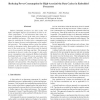Free Online Productivity Tools
i2Speak
i2Symbol
i2OCR
iTex2Img
iWeb2Print
iWeb2Shot
i2Type
iPdf2Split
iPdf2Merge
i2Bopomofo
i2Arabic
i2Style
i2Image
i2PDF
iLatex2Rtf
Sci2ools
DATE
2003
IEEE
2003
IEEE
Reducing Power Consumption for High-Associativity Data Caches in Embedded Processors
Modern embedded processors use data caches with higher and higher degrees of associativity in order to increase performance. A set–associative data cache consumes a significant fraction of the total power budget in such embedded processors. This paper describes a technique for reducing the D–cache power consumption and shows its impact on power and performance of an embedded processor. The technique utilizes cache line address locality to determine (rather than predict) the cache way prior to the cache access. It thus allows only the desired way to be accessed for both tags and data. The proposed mechanism is shown to reduce the average L1 data cache power consumption when running the MiBench embedded benchmark suite for 8, 16 and 32–way set–associate caches by, respectively, an average of 66%, 72% and 76%. The absolute power savings from this technique increase significantly with associativity. The design has no impact on performance and, given that it does not have mis-pre...
Cache | Data Cache | DATE 2003 | Embedded Processor | Hardware |
Related Content
| Added | 04 Jul 2010 |
| Updated | 04 Jul 2010 |
| Type | Conference |
| Year | 2003 |
| Where | DATE |
| Authors | Dan Nicolaescu, Alexander V. Veidenbaum, Alexandru Nicolau |
Comments (0)

